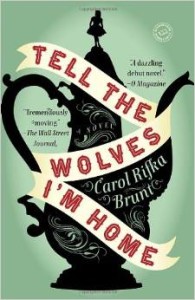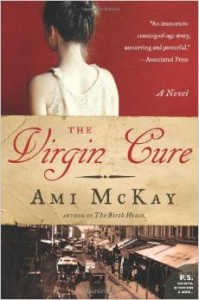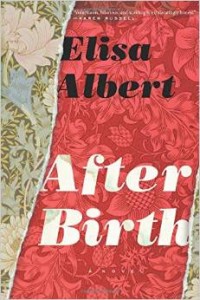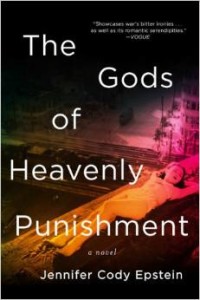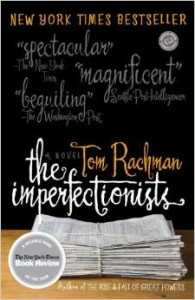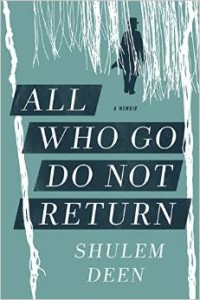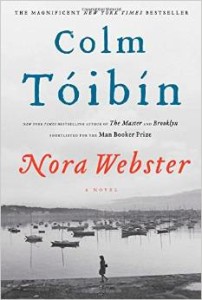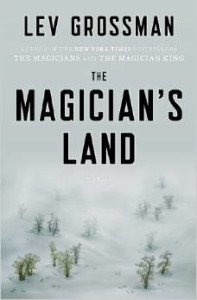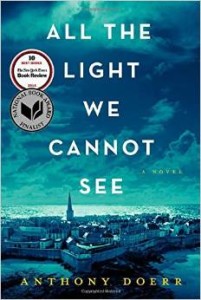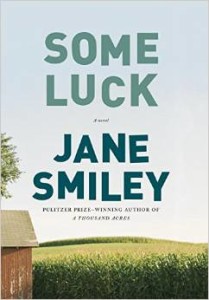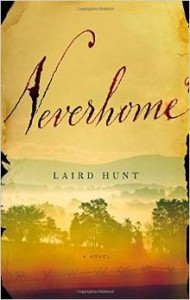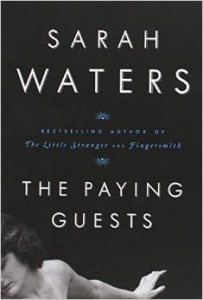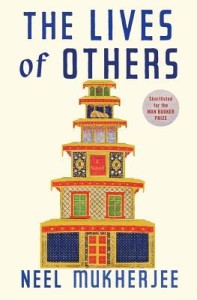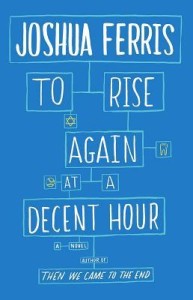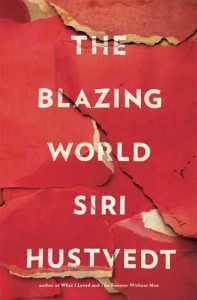Welcome to His Brother’s Keeper, a fictional mystery series set in 2000, in New York. I’ve decided to periodically lend my blog to a friend, Eva Hirschel. Eva doesn’t have a social media presence but she does have a mystery that she wanted to publish serially on-line, so I’m giving her a hand. (If you’re just tuning in now, I suggest that you start at the beginning). Here is Part I, Chapter 7. Enjoy!
Chapter Seven
 Mrs. Freiburg lived with her son and daughter-in-law on a quiet street that intersected 13th Avenue, the main shopping street of the area. Their cavernous new house stood on a lot that once held two houses joined by a common wall. Like many of the Jews in this neighborhood, they had torn down a structure that once contained four modest apartments and rebuilt to accommodate the needs of one large, wealthy family. As families in Borough Park continued to expand, more and more houses were being torn down and rebuilt. As if the double-parked cars did not make it difficult enough, each block had multiple construction projects going on at any given time, making the narrow streets even harder to maneuver. I drove around the block several times until I finally found a parking spot.
Mrs. Freiburg lived with her son and daughter-in-law on a quiet street that intersected 13th Avenue, the main shopping street of the area. Their cavernous new house stood on a lot that once held two houses joined by a common wall. Like many of the Jews in this neighborhood, they had torn down a structure that once contained four modest apartments and rebuilt to accommodate the needs of one large, wealthy family. As families in Borough Park continued to expand, more and more houses were being torn down and rebuilt. As if the double-parked cars did not make it difficult enough, each block had multiple construction projects going on at any given time, making the narrow streets even harder to maneuver. I drove around the block several times until I finally found a parking spot.
There was something odd about the streets here, with enormous, expensive houses going up next to humble multi-family homes and neglected apartment buildings. Unlike other run-down areas, people who could afford to move out were choosing to stay. Jews who lived a traditional lifestyle had fewer choices about where to live. They had to be within walking distance of their synagogue, since driving cars was prohibited on Shabbat. And Borough Park was a full-service neighborhood for observant Jews, with its kosher restaurants, grocery stores, bakeries, and butchers, its wig shops, religious bookstores, its schools and synagogues. In Borough Park, you could leave your car for free at a meter on Saturdays, but not on Sundays, a reversal of the usual New York City parking regulations. Sunday was the big shopping day here, when Jews from all over the tri-state area packed the streets looking for kosher groceries and delicacies, deals on clothing and shoes, and religious items and books. Luckily it was a Tuesday; otherwise parking would have been absolutely impossible.
As I walked from the car to Mrs. Freiburg’s house, I had a strange feeling, like someone was watching me. I didn’t know how to explain the feeling, which up until that moment I thought only happened in books. I reassured myself with the thought that even though I had taken care to wear a long skirt to this meeting, it was still clear that I was not from this community. I was probably just providing someone with a glimpse of otherness. Still, I couldn’t shake the uncomfortable feeling.
I turned to go up the few steps leading to the Freiburg’s door, and out of the corner of my eye I saw a young man. He was dressed like most of the other men in the neighborhood, in a black suit and white shirt, with a black hat on his head and a full beard. More than that I couldn’t make out. There was certainly nothing exceptional about him, or about his presence on the street behind me. Except that as I turned to get a better look at him, he lifted his head and looked at me right in the eye. I was able to see enough under the brim of his hat to detect a scowl and a flash of anger in his eyes. Having made eye contact, he quickly averted his head and hurried away down the street. The glance unnerved me; I knew that these men did not normally make eye contact with women, certainly not with outsiders, and certainly not on purpose.
Before I could think more about who he was and what his look meant, a young woman opened the door. She motioned for me to come in, not meeting my eyes. Since her head was averted, it was hard to see what she looked like, other than that she was dark and young, probably in her early twenties. She wore a highly tailored brown wool dress and dark brown stockings. Her hair was pulled back in a large gold-colored clip at the back.
“You’re here to see Mrs. Freiburg?” she asked, though it sounded more like a statement than a question. “Mrs. Marcus, yes?”
“Yes,” I answered, though technically I was Ms. Marcus, not having taken my husband’s last name. Mrs. Marcus was my mother. Whatever.
“Come with me.”
She led me down the narrow hallway into the living room, a spacious but spare room decorated in white and gold. On one wall there were what I took to be family photographs. Besides the photographs, the only other decoration was a large painting of a Chasidic rabbi, though I couldn’t identify which one. My education hadn’t progressed that far yet. The bookshelf was full of dark, hardcovered books with gold writing that looked to my untrained eye to be Hebrew but could have been Yiddish. The room was attractive, yet somewhat lacking in personality.
I was expecting a frail, old woman, still in bed recovering from surgery. Mrs. Freiburg, however, sat in a gold brocade easy chair, looking very well indeed. She was a good-looking woman in her mid-seventies, her champagne colored hair perfectly coifed and her blue knit sweater and skirt set sufficiently modest but obviously well-made and expensive. I assumed the hair was a wig, but what did I know? For the most part, all I knew was some second-hand information and lots of stereotypes. It was amazing that I had spent most of my life ten minutes away from this Brooklyn neighborhood of Borough Park yet except for an occasional excursion over here to buy kosher-for-Passover cakes, a babka for Shabbat, or the annual lulav-and-etrog-buying trip, I had virtually nothing to do with it or with the people who lived here.
Mrs. Freiburg welcomed me warmly, as if I myself might have been a long-lost relative. After the introductions were conducted and I took a seat on the couch across from her, Mrs. Freiburg offered me a choice of teas. There must be a conspiracy to deny me coffee, I thought to myself, as I politely opted for mint. She turned to the younger woman, who had stood in the doorway during the introductions, and instructed her to prepare the tea.
“That’s my granddaughter, Rivkie,” she said, as soon as the young woman left the room. “I am so lucky to be living here with my grandchildren around me. Shmuel has nine children, each of them a blessing. Do you have children?”
“Yes,” I answered, grateful for the choice of an opening topic. “My daughter Hannah is four and my son Caleb is two.”
“Wonderful ages, wonderful. And I am sure they are blessings to you. I myself have three children. In those days, who could have nine children! So many children died young, never mind being able to feed so many mouths. But here in America, anything is possible. And my son, thank God, is a good provider. He owns an electronics store here in the neighborhood together with my middle son, Nachum. Such a good business. I don’t understand half the things they sell, but they do a good business. He has a good head, Shmuel. Mail order, people from all over the country they write to him, on the computer. My third son Aaron, also he has a good head. But not for business. He’s the scholar. That’s Aaron who studies with your Rabbi Springer. A nice fellow, a good neshama. Rabbi Springer has been here a few times for Shabbos. ”
“All boys,” I commented inanely, not sure how to get around to the subject I was here to discuss.
A dark shadow passed over her face. She sighed. “I had a girl too. My first-born. Rina. They got her. We were on our way to freedom, so close to the border. But they got Rina. I saw the whole thing. A mother should never know from that. She was only a baby.”
“I’m so sorry,” I said softly. “I apologize, I didn’t realize–”
“No, no,” she said, warmly. “It’s important to remember. And it’s part of the story you came to hear. The boys, they were born here, once we were safe.”
At that moment Rivkie came back into the room, carrying a tray. “Come, Rivkie. Meet our guest.”
Rivkie approached us and set the tray down on the table. “Hello,” she said stiffly, still not meeting my eyes.
When Rivkie left the room, Mrs. Freiberg poured us each a cup of tea and offered me a cookie, which I accepted.
“I apologize that Rivkie was less than welcoming,” she said, sighing. “You see, this is complicated for us. I agreed to see you out of respect for Rabbi Springer, who has been a good friend to my son and has been a guest of this family many times, and who is a mensch. But not all my family is in agreement that I should speak to you.”
“I’m sorry to put you in an uncomfortable position,” I said.
“No, don’t worry, there are some nice things about being the family matriarch. And the rebbe said it was all right. Still, well, you know, people can be stubborn.”
“May I ask what the issue is?”
Mrs. Freiburg opened her mouth to speak, paused, and closed her mouth. She looked down at her fingers and sighed. Then she looked up at me again with a determined look in her eyes. “There are memories some of us don’t want to bring up again. Memories that are best forgotten. Things we learned about people we would rather forget. Sometimes, in desperate circumstances, the best that is in us comes out, and sometimes the worst. It was a tragedy what happened to the Halizchers. Some think it is best to leave their memories undisturbed, to remember only the good and not question what happened. And some are still angry, even so many years later. So to talk among ourselves, that is one thing. But to talk to someone not from among us, well, that is something else. We do not do it often, or easily. But the rebbe said it would be best to talk to you. It may upset an old man to know that he is not part of that family, but if your research does help you find his long-lost brother, then truly a mitzvah has been done. The rebbe has a caring heart. If there is good to be done, he believes it should be done.”
“May I ask, who is this rebbe you’re speaking about?”
“Yes, yes, of course you may ask. My husband, alav hashalom, was not raised in a Halizcher household. His family were Naidover Chasidim. Like the Halizchers, the Naidovers were for the most part destroyed in the war. But a remnant survived, or got out beforehand, like us. After the war we rebuilt and grew once again. It was a beautiful thing, the rebuilding of the Naidovers. I have always missed some aspects of being a Halizcher, but it was really not a choice, since first of all my husband was a Naidover, and anyway there were no more Halizchers. You see, the Naidover rebbe, zikaron livracha, got out just in time, and made it to Eretz Yisroel, where he died. His son became the next rebbe. We are small compared to some of the other groups of Chasidim, but we are growing all the time. There were some very difficult years, much darkness, and hope was a luxury, but here we are.”
“I appreciate your willingness to talk to me. I understand that this may be difficult.”
“Yes. But that is my choice. I made it, and my family will have to respect that. Besides, I’m a sick old woman. Who can say no to me?” She laughed. “You see, there are some nice things about getting old. Sometimes I get my way.”
I smiled back at her. I had a feeling she often got her way.
“So let us begin. I understand you’re doing genealogical research for someone who thinks he might be related to the Halizcher rebbe, zikaron livracha. It’s funny, for so long American Jews tried to run away from their roots, and now everyone can’t wait to find them again.”
“His granddaughter is my client, actually,” I explained. “This is supposed to be a surprise, so I can’t ask him questions myself. It makes my research more complicated, but interesting. So first I’m trying to learn about the Halizchers themselves.”
“Interesting it may be, but fruitless. You see, it’s impossible that anyone from the family survived.”
“You’re probably right, but you never know. There was so much confusion during those years, I understand. And miracles happened.”
“Yes,” she smiled, “Miracles certainly did happen. I will tell you what I can, and who knows.”
She folded her hands in her lap and took a deep breath. “I was born in a shtetl near Halizch. My parents were followers of the Halizcher rebbe. He was a good man, he was known far and wide for his compassion and his wisdom. People came to him with their problems, there was no lack of problems, and he would offer hope, and remind people to find the joy in life. It was said that just a glance from him could cure a broken heart. The glass was always half full, you know what I mean? To everything there was a silver lining. He had a loud but melodic, sing-songy kind of voice, and a big beautiful smile. He was a scholar, but it was said that even moreso his grandson was a scholar.
“This grandson was the son of the rebbe’s daughter, Basya. He had four daughters, and he loved them all. Never a word passed his lips about not having a son. Even that he turned in to a positive, he would say, ach, what son-in-laws God would sent to him, what a gift to have daughters. There was Ruchel, the eldest, then Basya, then Sura, then Chaya Esther. Ruchel and Basya married brothers, Yitzhak and Nossen Shlomo Gelberman. Sura and Chaya Esther never had a chance to marry, poor souls. Chaya Esther was the baby, the child of her parents’ old age. Such a beauty, only a young girl when the war began. She never got to grow up. Ruchel too was a sad story, despite the rebbe’s optimism. Yitzhak was a chasid at first, a wonderful scholar, but he got introduced to other ideas that turned his head. He became a Zionist, and left for Palestine with Ruchel when I was still a young girl. I barely remember her, though one thing I do remember is that everyone used to joke how Ruchel and Yitzhak looked so much alike. They both had flaming red hair, like it was on fire. Like they were on fire with the idea of Zionism.
“Once, twice, a letter came from them, life was very difficult there for them, and then that was all. It was assumed that they died. They were never heard from again, as far as I know. It was so painful for the rebbe and his wife. No one knew how to comfort them.
“What did help was that Basya and Nossen Shlomo had two sons. There were more, but they died as babies, which was not uncommon then. But those two were like miracles from the Almighty. One more beautiful than the other, and smart, so smart. Which was good, because there were some doubts about Nossen Shlomo. A mensch, he was a mensch, yes, but it became clear that he was not the right material to be the next rebbe. He was a quiet man, reserved, shy, nothing special as a scholar. He was a devout man, a true chasid, righteous and devoted to God, devoted to his father-in-law, but… But. You know? A follower.
“The sons were Leib Mendel and Yaakov Chaim. They were both a little bit younger than I, so they must have been born around 1926, 1927. They were close in age. Very competitive, as children can be, but good boys. And Leib, the Chasidim said the light of Torah shone from his eyes. They were like two little princes, the boys. The rebbe’s grandsons! How he adored them. Leib was brilliant. Before he even became bar mitzvah he was giving discourses on Talmud and Torah, explicating fine points that even scholars didn’t understand. He was a gifted speaker, and people would come to listen to his words of Torah. But his singing, oh his singing. The rebbe loved to have the boy sing in his beautiful, clear voice, it was like it reached right up to heaven. Nothing could bring joy into the hearts of the Halizcher Chasidim like the boy Leib’s singing. Shabbos with the Halizchers was something special. Seudat shlishi, the last meal before the end of Shabbat, oh, the stories that were shared, the songs that were sung.” She sighed. “But he never became bar mitzvah. He never grew up, he never became the next rebbe. Such a tragedy.”
“What exactly happened?” I asked. “I’ve only heard bits and pieces.”
“The Holy One acts in ways we don’t always understand. We were rounded up and taken to the ghetto in 1941. I was already married by then and my husband found a way out for us. I hated to leave my parents and my brothers and sisters, and I didn’t know what to do. But I wanted to grab any chance I had to live, and for my baby to live. I went to the rebbe and I asked him what to do. He told me to stay. He said that we belonged in Poland, that it was our home. America was the treifa medina. America was not a place for Jews, it just ate them up and spit them out, that we would lose our Judaism there. That whatever happened, it was in God’s hands. I left anyway, with a heavy heart that has never healed. It was not easy for me to go against the rebbe’s advice. It was not easy for me to leave my family. I never saw any of them again. My mama. My papa. My sister Yehudis. My baby brother Aaroneleh.
“But more than anything, I remember those piercing blue eyes of the rebbe’s when he told me stay. I have never seen eyes like that again. The only one in his family who had those eyes was the grandson Leib. Not any of the daughters, though Chaya Esther had blue eyes they were not the same deep blue, and not Yankeleh. Just the rebbe, and Leib. They were eyes that ached when you ached, cried when you cried, yet never gave up hope, never succumbed to despair. They were like deep wells of compassion, love, and faith. I remember looking at his eyes that day. I thought I saw a tear slide down his cheek as he spoke to me, but I couldn’t be sure. Once I realized that I wouldn’t listen to his advice, I couldn’t look him in the eye again. I looked away as he continued to speak to me, feeling like I was betraying him. I will always ask myself if that is why my baby Rina died, was that my punishment? And yet, I survived, and here I am, with my family. You see? There are things I don’t understand. Many, many Chasidim died there in Poland, including all my family, even my little nephews, while some Jews survived. Some rabbis encouraged their people to get out. Some encouraged them even to fight back, to join the partisans. But not the Halizcher rebbe. He died in Treblinka, doing good and helping others until the moment he died, it is said. It is said that he died smiling, singing to God a song of rejoicing. But they all died, and that was the end of the Halizchers.
“The grandson could have been saved, the Halizchers offered the rebbe their money and somehow got the boy a visa, but the rebbe chose another path. It would have shown a lack of faith in God, perhaps. Perhaps he thought that the best way to fight back was spiritual resistance, to support his people by showing how strong his faith was. He was put in an impossible situation by his Chasidim, you see, because if he had accepted their money and the visa, it would have shown them that his faith was less than perfect.”
“So you don’t blame him for what he did?’
“Blame him, no. It is not for me to judge such a man. Could it have turned out differently? Yes, of course. Could my family have survived? Who knows? We barely did, my husband and I, and we were young and healthy. But one cannot ask those questions about that time. What happened, happened. For a reason, though we don’t understand the reason. It’s not for us to question, just to keep doing good and believing. That we are here today shows that despite the lives lost, we won. Our belief in God conquered in the end, you see,” she said, with a wry smile. “The Halizchers did not survive, as a group, true, but enough of us did so that we could replant ourselves here in America, and in other places around the world. We are stronger than ever, and growing all the time. More and more Jews are coming back to Judaism. Every day we are closer to yamot ha-Mashiach, the days of the Messiah.”
She seemed so sure, but for my own peace of mind, I just had to ask. “And you’re absolutely sure, there’s no way any of them could have survived. Not Leib, and not Yankeleh?”
“No, it’s impossible,” she answered. “Impossible.” She was distracted momentarily by something behind me. When she turned back, she looked down as she spoke, not meeting my eyes.
“But how can you be so sure?” I asked.
“We would have known,” she answered. She looked up at me again, but it was as if a curtain had been pulled over her eyes. The small measure of familiarity and trust that had grown during our conversation vanished. Her animated warmth was gone. Suddenly I sat before her as a complete stranger. I didn’t understand what had just happened. I thought I had been sensitive and polite. Had my questions been too insistent? Had the conversation been too emotional? What invisible boundary did I cross? “We would have known. Such a thing would not have been able to happen without anyone knowing. We would have known.”
Before I could think how to respond to this statement, or the sudden chill in the room, I heard movement behind me. A bearded young man in traditional Chasidic garb walked over to Mrs. Freiburg and put his hands on the back of her chair.
“It’s time for you to rest now, Bubbe,” he said.
“This is my grandson, Arieh,” Mrs. Freiburg said. “Arieh, this is my visitor, Mrs. Marcus.”
He looked at me, nodded, then quickly looked away. I was startled to realize that he looked just like the man who had been behind me on the street. But of course it was so easy to get the men here mixed up, as they all dressed in a manner indistinguishable to an outsider like me. There wasn’t anything that would make him stand out in this neighborhood, except for the slightly menacing look on his face. He looked brooding and angry, and it felt like his concern for his grandmother might have something more to do with getting her to stop talking to me than making sure she didn’t tax herself. Even Mrs. Freiburg seemed uncomfortable around him, and I wondered how long he had been standing in the doorway listening to our conversation.
“Thank you so much for your help,” I said, as I got up. “I’m sorry if it was difficult for you.”
“No, no, thank you for coming and spending time with an old lady,” she said graciously. “If there is anything else I can do —”
Arieh placed his hands on his grandmother’s shoulders, effectively cutting her off mid-sentence. “I will walk you to the door.”
Without touching me, he hurried me out of the room and to the door. As I stood in the hallway putting on my jacket, he spoke.
“I hope you got what you needed. My grandmother is a generous woman who cannot say no, not even to sharing her nightmares. But I must ask you not to come back and not to call her again. It is too much for her. Talking about her life before she came to America gives her bad dreams that don’t go away even in the day. We must not let her dwell on those years. She is too frail.” He opened the door to let me out. “I thank you in advance for respecting this. And I also must tell you that you are barking up the wrong tree. You will not find anything useful for your research here. Many assimilated American Jews who know nothing about Chasidism, or even anything about being Jews, long for a connection to their Jewish past. If they find a photograph of a Chasid in the family album, they think they must be related to some glorious Chasidic dynasty. It is all just dreams, just fantasy, nothing more. If they were truly related, they would know, because they would still be part of their community.”
I knew he wanted me to leave, but I couldn’t let his last comment get by me without a comment. I turned back to him. “Do you mean to say that if somewhere in the family tree an ancestor was a Chasid but left Chasidism, that person has no right to claim a common heritage? Or do you mean that no one from Chasidic roots ever left Chasidism? You can’t really believe either of those things.”
Arieh looked out to the street beyond me, as if I did not exist. “Good-bye, Mrs. Marcus,” he said. “It is time to go home.”
About that he was right. It was time to go home, time to go back to my own family, my own neighborhood, and my own bad dreams.
***
The smell of garlic and olive oil filled the kitchen. Ronit was at the sink, rinsing broccoli. Borough Park was only ten minutes away, but I felt like I had just returned from a trip to a country where I didn’t know the language or understand the culture. Usually went I went to Borough Park I returned with a warm nostalgic feeling, like I had just dropped in on my family’s past. I would stroll 13th Avenue like a time-traveling tourist, benignly soaking up the atmosphere, looking at the elegant but modestly dressed women with their large, well turned-out families, pushing double carriages and strollers, all the girls or all the boys in a family often dressed in different sizes of the same outfit, older sisters pushing strollers or holding the hands of little boys in pigtails who had not yet received their first haircuts. I would make my purchases, enjoying the superficial, fleeting connection to a life that might have been mine if my ancestors had made different choices. Today, though, nothing about Borough Park felt benign. I left the Freiburg’s house with an unsettled, apprehensive feeling. Arieh Freiburg had stood at the door as I walked to my car, giving me the distinct impression that he wanted to make sure I really left.
Caleb jumped up when he saw me come in, and grabbed me around the legs. Hannah was on the couch, looking at a book. She would pay attention to me when she was good and ready, but Caleb was already excitedly recounting the details of his afternoon. There would be time to go down to my office after they had gone to bed.
“Hi,” said Ronit, starting to steam the broccoli. Her wavy brown hair fell over her shoulder and she swung it back out of the way while she worked. “You’re early. Did everything go okay?”
“Yeah, sure,” I answered, trying to unwrap Caleb from my torso so that I could take off my jacket and set down my bag. “I was in Borough Park. Interesting experience.”
“Oy, they’re nuts,” Ronit said. For Ronit, everything about Judaism was black and white. Anyone religious was nuts, and anyone secular was normal. Orthodox and Chasidic were the same for her, there were no gradations and no contours. She had never encountered liberal Judaism before coming to the United States, and still didn’t know quite what to make of it. Never having met a woman rabbi, she was fascinated by Leah, though not enough to ever come to synagogue with us. “No really, they’re nuts. They just do whatever the rebbe tells them. They don’t think for themselves. They’re very simple-minded, weak people who need all those rules to help them live their lives, because they can’t think for themselves. The rebbe tells them to vote one way, they do it. At election time they fly over to Israel from Brooklyn and elect the most right-wing, religious candidates, then fly home to Brooklyn.” Her eyes flashed with intensity as she spoke. “They should stay here and mind their own business. We don’t need them or their votes.”
“That’s not true. The woman I saw today was definitely not someone who is either simple-minded or unable to make her own decisions. You can’t judge like that, Ronit.”
She smiled. “I know, I know. What do Israelis know about American Judaism. Right? Anyway, Simon called, he’ll be home around nine. He’s at a client’s, but you can get him on his cell phone. I did a few loads of laundry – everything is folded on top of the dryer. I’m going to finish up dinner, and then Shuki and I are going to see a movie.”
“Ah, the joys of being young and childless. Thanks so much.” Never mind Simon, what would I do without Ronit in my life? “Ronit, you are the best!”
She shrugged, embarrassed by my effusiveness, and bent down to hug Caleb, who was now busy sliding magnets under the refrigerator. “The best for the best!”
I sat with the kids while they ate their dinner and told me about their day. As I cut up apples for their dessert, Hannah regaled us with information about the different kinds of apples in the world — Macintoshes, Delicious, Jonathans, Macouns, Granny Smiths, Empires — and the differences between them. Her class was doing a unit that was strangely entitled “Cows and Apples” – the joys of sending children to a progressive school with a creative curriculum. She was excited about next week’s class trip to an apple orchard, and ran to get the note that she had brought home.
“Please, Mommy, please come with us. They need some parents to come. Please, please!” she cried.
“I’ll try my best. It would be fun, sweetie,” I answered reassuringly, trying to figure out how I was going to fit a day of apple picking in to my schedule. If Hannah wanted me to go, I had to find a way to swing it. Another good reason why fictional P.I.’s never had any children — they wouldn’t have been able to take a day off for class trips. After bathtime it was time for dinosaur stories and Charlie and the Chocolate Factory, followed by hugs, kisses, more hugs and kisses, and some stern good-nights. At last I was free to go downstairs, where I threw myself on the couch. Just five minutes for myself, before I got up to set the table dinner, round two.
Although what I knew about Chasidic life held little appeal for me, there were certainly things I could appreciate. I liked the idea that Rabbi Springer had spoken about, of the blurring of the distinction between “holy” and “profane,” of recognizing the sanctity and miraculousness of everyday life. I had been struggling lately with the question of what it meant to raise ethical children, and how to teach the children about what is sacred in life.
When I brooded over questions like these, Simon tended to think I had too much time on my hands. He was raised in a Yiddish-speaking, Workman’s Circle socialist family, where religion was the opiate of the masses, something that educated people left behind as soon as possible. I, on the other hand, had been raised in a moderately observant family that had belonged to a Conservative synagogue until the rabbi took another position and the board refused to interview any women for the job. In protest, my parents dropped their membership and joined a Reform synagogue, where they have been happy members ever since. When Simon and I had first discussed moving in together, he reluctantly agreed to keep shellfish and pork out of the house, and when we got married he agreed to join a synagogue. Since then, while he still complained that I took it too seriously, he had discovered that there were many worthwhile aspects to the Judaism that his parents had rejected wholesale. Over the eight years of our marriage we had achieved a comfortable balance of observance and had created holiday traditions that felt both connected to the tradition and at the same time wholly ours.
And yet, there was something surprisingly attractive about this world I was starting to learn more about, in which the rules were set for you, and in which certain questions weren’t asked. It must feel very safe and comforting to be part of a community like those the Chasidim created. But then I thought of Arieh Freiburg, and a chill crept up my spine. The questions I had asked were innocent enough, though granted perhaps painful. My purpose in going had certainly been harmless. So why had Arieh been so antagonistic? Why had my presence and my questions been threatening? What else was going on that I didn’t understand?
I heard the door open, and Simon walked in, interrupting my thoughts. After he took off his tie and washed up, we sat down to eat, and I filled him in on the day’s events.
Simon expertly twirled his pasta around the fork, then held the fork in midair. “Abby,” he said in exasperation. “Are you sure this case is a good idea? It sounds like there are things going on here that may be bigger than you realize. And you don’t even know who this Sarah Gelberman really is. For all you know, she could be some nefarious criminal.”
I laughed. “Simon, really, she’s a kid. Granted, she may not have told me everything, but she’s not dangerous. And I’m sure Arieh Freiburg is just suspicious of all outsiders. I probably made him uncomfortable because I’m clearly not one of them, and a woman to boot. They’re taught not to deal with women who are not related to them.”
“Really? And you know that because…” Simon answered, the pasta still uneaten on his fork. “The truth is, you have no idea. You have no idea who this Sarah Gelberman really is, and you have no idea what the deal is with this Arieh Freiburg. They’re not all just the nice old-world Jews from Sholom Aleichem stories. They’re people too, and some of them may even be bad guys.”
I was in no mood for a lecture. “Simon, come on. I’m not a babe in the woods you need to protect. I think you’re getting me confused with Hannah. Eat before your food gets cold.” I helped myself to more wine, and replenished Simon’s glass while I was at it.
“Abby, I care about you. Okay? I’m just concerned. You know nothing about Sarah Gelberman, and you know nothing about the Chasidim. You’re jumping in to a whole world you don’t know, a world very different than your own.”
“Different, yes, but they’re Jews, for God’s sake Simon, different than us, but more like us than not.”
“Are you sure about that? Are you really willing to say we have more in common with the Chasidim than we do with our non-Jewish colleagues and friends, people who live in the same world we do, who went to the same schools and live in the same neighborhoods? Can you really say that we have more in common with the Chasidim, just because we both happen to call ourselves Jews? We’re practically two different religions.”
“No, I don’t agree. It’s just two different ways of getting to the same point.”
“Which is?”
“Which is, living as good ethical people, trying to figure out what we’re here on this earth to do, and hoping for a better future.”
“That’s it?”
“That’s it.”
“You’ve got to be kidding. Where’s your natural cynicism? Not that I have anything against them, but I sure don’t have anything in common with them.”
“Maybe not, but in Nazi Germany, both you and they would have been rounded and put into concentration camps together just because you were Jews. Hitler didn’t care whether you wore a kippa, or a streimel, or went bareheaded.”
Simon put down his wineglass and looked at me, shaking his head. “No need to get dramatic, Abby. Just promise me you’ll do what you can to find out more about Sarah Gelberman. Okay?”
“Okay,” I agreed. “I’ll do my best.”
We ate in companionable silence for a few moments. I could tell from the furrows in Simon’s forehead, and the way his eyebrows were going up and down, that he still had more to say on the subject but was trying to control himself.
Finally, he said, “I hope you realize that this guy may not even be remotely connected to anything Chasidic. It may have just been his romanticized fantasy of what an authentic Jewish past would look like, something to make the grandchildren proud of their roots. You have to consider this.”
“Consider it considered,” I answered. “Now let’s change the subject. Want to go to Altoona, Pennsylvania this weekend?”
Simon looked at me quizzically, his mouth full of pasta. “Oh, no, Abby. What’s in Altoona?”
“I hear it’s got some great tourist attractions. Haven’t you always wanted to see the Horseshoe Curve? Caleb and Hannah would love it. And it would be beautiful at this time of the year. Think farm stands, fresh cider, apples, pumpkins —”
Having chewed and swallowed, Simon interrupted me. “Altoona, Pennsylvania is about six hours from here. That would be a fun car ride with the kids, and really worth it just to get the same cider and pumpkins we could buy at any farm stand in a sixty mile radius of New York City, not to mention at the Greenmarket in Grand Army Plaza, and not to mention at the Coop itself. Yes, I’d like to see Horseshoe Curve, but not badly enough to drive six hours to get there, otherwise I would already have done so. So out with it, woman, what’s in Altoona?”
“Sarah Gelberman told me her grandfather retired to Winter Park, Florida, after having lived in New York City for years before that. I found a man —”
Simon interrupted me. “Wait, that’s the mystery right there! What’s he doing living in Winter Park? Jews don’t retire there. That’s in yenevelt, the middle of nowhere. Jews retire to Miami, Fort Lauderdale, maybe Sarasota, but not Winter Park. Something’s not right.”
“As I was saying,” I continued archly, “I found a man by that name living in Winter Park, but he never lived in New York. He lived in Altoona.”
“No way, Abby, no way. No. This is insane. You seriously want to drive six hours, with a two year old and a four year old, just to find out, just to find out what exactly? That maybe a man by this name, who may or may not be the grandfather of someone who may or may not be named Sarah Gelberman, once lived there. That’s crazy. What about the internet?”
“The internet isn’t good for everything. For the information I need now, I need to talk to real people, not a computer. I need casual conversation. I need to go to services at the local synagogue. And we need to leave very early in the morning on Friday so that I can get there before the county clerk leaves for the day.”
“No. No. No way. Sorry, Abby. You know I want to be supportive, but this does not sound like a reasonable plan. I have a lot going on at work, and I can’t take off Friday. This one is just a no. Go by yourself, take the train, rent a car, but no, sorry, we’re not going. End of conversation. Okay?”
“Okay.”
Simon and I finished the meal amicably, talking about the kids and Simon’s day at work. I opted not to go down to my office until the morning, though I did manage to place one crucial phone call before Simon and I retired early. We sat in bed together watching N.Y.P.D. Blue and then turned out the lights to focus on more pleasant matters.
The next morning I made reservations for two adults and two children at the Altoona Day’s Inn.
[To be continued…]
His Brother’s Keeper is entirely fictional. None of the characters or situations described in this series are based on real people or events. Copyright (c) 2015 by Eva Hirschel.
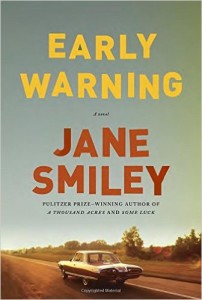 This second book in Smiley’s trilogy about an American family, following Some Luck, did not disappoint. In fact it was, once again, a distinct pleasure. Like the first book in this series, each chapter is another year in the life of the Langdon family, seen through the experience of one of the extended family members. This volume begins in 1953 with the family now far-flung across the country and only a small handful still left in and around the family farm in Iowa. What was once a nucleus of a family working together to eke out an existence on the land is now a loose collection of related but diverse groups creating their own narratives, including the next generations of the family. Their encounters with the events of the post-war years spin out in a myriad of ways, and yet there are still threads that connect them deeply to each other, often in surprising cross-generational ways. As in Some Luck, Smiley’s writing can at times seem deceptively prosaic, but the powerful beauty of this family tale shines through as the characters move through their encounters with love, loss, deception, desire, vulnerability, and all of that which makes us who we are in a constellation of others.
This second book in Smiley’s trilogy about an American family, following Some Luck, did not disappoint. In fact it was, once again, a distinct pleasure. Like the first book in this series, each chapter is another year in the life of the Langdon family, seen through the experience of one of the extended family members. This volume begins in 1953 with the family now far-flung across the country and only a small handful still left in and around the family farm in Iowa. What was once a nucleus of a family working together to eke out an existence on the land is now a loose collection of related but diverse groups creating their own narratives, including the next generations of the family. Their encounters with the events of the post-war years spin out in a myriad of ways, and yet there are still threads that connect them deeply to each other, often in surprising cross-generational ways. As in Some Luck, Smiley’s writing can at times seem deceptively prosaic, but the powerful beauty of this family tale shines through as the characters move through their encounters with love, loss, deception, desire, vulnerability, and all of that which makes us who we are in a constellation of others.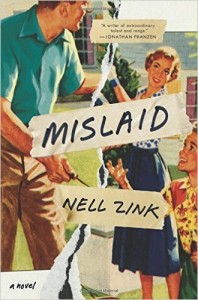 I loved the premise of this book, perhaps even more than the book itself. The title is indeed clever. But where it may disappoint (more on that later), it is still worth a read. The plot is a challenge to the easy binaries that make up our collective narrative. Identity and self-representation, sexuality and race, are all thrown into the mix and stirred together into a murky stew. As an adolescent, Peggy aspires to be a man and believes herself to be a thespian, later corrected to lesbian. So she goes to an all-women’s college in rural Virginia, complete with a deeply metaphoric swampy lake of hidden dread. There she meets an instructor, a louche, penniless gay poet from a local wealthy family. They jump into a sexual relationship, get married, and have two children, a son and a daughter. Because what else would one expect from a lesbian college student and her gay professor (get it, Mislaid??)? Jumping ahead a bit, she leaves him and takes just the daughter with her. The daughter is a blond, wan little girl, but somehow Peggy manages to convince everyone that they are black, so that she can successfully hide their real identities and not get found by her husband. The characters are rich and complex, but without totally spoiling things, I’ll just say that the story gets too easily gift-wrapped up with an unbelievably redemptive happy-ever-after conclusion in which everyone gets let off the hook. Still, definitely lots here to discuss and dissect.
I loved the premise of this book, perhaps even more than the book itself. The title is indeed clever. But where it may disappoint (more on that later), it is still worth a read. The plot is a challenge to the easy binaries that make up our collective narrative. Identity and self-representation, sexuality and race, are all thrown into the mix and stirred together into a murky stew. As an adolescent, Peggy aspires to be a man and believes herself to be a thespian, later corrected to lesbian. So she goes to an all-women’s college in rural Virginia, complete with a deeply metaphoric swampy lake of hidden dread. There she meets an instructor, a louche, penniless gay poet from a local wealthy family. They jump into a sexual relationship, get married, and have two children, a son and a daughter. Because what else would one expect from a lesbian college student and her gay professor (get it, Mislaid??)? Jumping ahead a bit, she leaves him and takes just the daughter with her. The daughter is a blond, wan little girl, but somehow Peggy manages to convince everyone that they are black, so that she can successfully hide their real identities and not get found by her husband. The characters are rich and complex, but without totally spoiling things, I’ll just say that the story gets too easily gift-wrapped up with an unbelievably redemptive happy-ever-after conclusion in which everyone gets let off the hook. Still, definitely lots here to discuss and dissect. The main character in this novel is anxiety, of the particular New York City kind. The many human beings who inhabit this novel are secondary to the free-floating anxiety that runs through the pages of this book. Anxiety about extreme weather, about a changing city and its changing neighborhoods, about the growing gap between the haves and the have-nots, about growing old and isolated in the city, about finding a way to have a meaningful life in the middle of urban anonymity – all these kinds of anxiety run through this tale. And yes, it made of an anxious reading experience. I wanted more – I wanted the characters to rise up out of the anxiety – but they did not. And yet the idea of a mighty city being at the mercy of forces beyond its control, and thereby being reshaped by forces both within (economics and changing demographics) and without (flooding as a result of climate change) are powerful metaphors for aging. The two main characters, Marie and Simone, are French immigrants who survived the war to come to the United States as young women. Close friends who have both now outlived their husbands and launched their children off into the world, they decide to take a painting class. The others who people this book are their neighbors, their children, and those they meet in the painting class. As New York submits to excess water it cannot control, the lives of these two stalwart survivors too are battered by forces outside of their control.
The main character in this novel is anxiety, of the particular New York City kind. The many human beings who inhabit this novel are secondary to the free-floating anxiety that runs through the pages of this book. Anxiety about extreme weather, about a changing city and its changing neighborhoods, about the growing gap between the haves and the have-nots, about growing old and isolated in the city, about finding a way to have a meaningful life in the middle of urban anonymity – all these kinds of anxiety run through this tale. And yes, it made of an anxious reading experience. I wanted more – I wanted the characters to rise up out of the anxiety – but they did not. And yet the idea of a mighty city being at the mercy of forces beyond its control, and thereby being reshaped by forces both within (economics and changing demographics) and without (flooding as a result of climate change) are powerful metaphors for aging. The two main characters, Marie and Simone, are French immigrants who survived the war to come to the United States as young women. Close friends who have both now outlived their husbands and launched their children off into the world, they decide to take a painting class. The others who people this book are their neighbors, their children, and those they meet in the painting class. As New York submits to excess water it cannot control, the lives of these two stalwart survivors too are battered by forces outside of their control.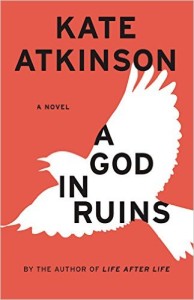 This book came highly recommended by someone whose taste in books I respect, and so I dove in. But I admit that I was surprised to like it as much as I did. This story tells the tale of the 20th century through the character of Teddy, first a beloved young boy in England, an aspiring poet, then a pilot in the war, and later as a husband, father, and grandfather. Surprise is indeed a major element in this tale, as Teddy’s life continues to unfold in unexpected ways. Surviving the war, when so many British pilots did not, is one of the main elements that makes Teddy who he is. Having accepted the idea that he might never have a future, he has to figure out how to live in that future. Again and again, he encounters situations he never expected to have to face, and manages to find a way through. There is nothing remarkable about Teddy, yet his kindness and compassion make him a character worth caring about. And then Atkinson plays with us, taking away what she has just given us readers, and poses the very writerly question: what if? What if indeed. That is the question that the writer wrestles with in the privacy of his or her own head, the very core of writing fiction. Writers do not generally expose this question to the reader. But Atkinson puts the question right out there and asks us to wonder along with her: What if…
This book came highly recommended by someone whose taste in books I respect, and so I dove in. But I admit that I was surprised to like it as much as I did. This story tells the tale of the 20th century through the character of Teddy, first a beloved young boy in England, an aspiring poet, then a pilot in the war, and later as a husband, father, and grandfather. Surprise is indeed a major element in this tale, as Teddy’s life continues to unfold in unexpected ways. Surviving the war, when so many British pilots did not, is one of the main elements that makes Teddy who he is. Having accepted the idea that he might never have a future, he has to figure out how to live in that future. Again and again, he encounters situations he never expected to have to face, and manages to find a way through. There is nothing remarkable about Teddy, yet his kindness and compassion make him a character worth caring about. And then Atkinson plays with us, taking away what she has just given us readers, and poses the very writerly question: what if? What if indeed. That is the question that the writer wrestles with in the privacy of his or her own head, the very core of writing fiction. Writers do not generally expose this question to the reader. But Atkinson puts the question right out there and asks us to wonder along with her: What if…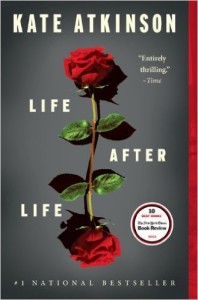 This novel came before A God in Ruins, which was written as a companion to it. But I read them the other way around, and so my reading of this one is informed by having read them in this order. The characters in Life After Life are much the same as in A God in Ruins, though with different focus. The novel centers around Ursula, Teddy’s older sister. Teddy himself appears at certain moments, as do other members of their family. But Ursula is the main attraction. Like A God in Ruins, this novel is a tale of the 20th century told through the story of one person, in this case Ursula. Born in 1910 on a snowy night when the doctor can’t through to the house, she is miraculously saved. Or is she? In fact, she dies before she can draw her first breath. Or does she? Throughout her life, Ursula dies, over and over and over, coming to various experiences and ends, or not. Through the life, or lack thereof, of Ursula, Atkinson explores the ideas of chance and destiny, of the impact that one person has on the world and those around him or her, and the question of what can happen if just the slightest change is made in one’s routine. If “a” happens, does it necessarily lead to a life of “b”? But if one can avoid “a”, then can one avoid “b”? One small act can lead to life of utter misery, or even death, while a different and equally banal act can lead to life of joy. It is the eternal question of the road not taken, and an exploration of how one small choice can cause a life to cascade into a completely different future. Though this kind of device could become kitschy or even annoying in some hands, Atkinson manages it masterfully, and creates a captivating reading experience in which it’s hard to put the book down.
This novel came before A God in Ruins, which was written as a companion to it. But I read them the other way around, and so my reading of this one is informed by having read them in this order. The characters in Life After Life are much the same as in A God in Ruins, though with different focus. The novel centers around Ursula, Teddy’s older sister. Teddy himself appears at certain moments, as do other members of their family. But Ursula is the main attraction. Like A God in Ruins, this novel is a tale of the 20th century told through the story of one person, in this case Ursula. Born in 1910 on a snowy night when the doctor can’t through to the house, she is miraculously saved. Or is she? In fact, she dies before she can draw her first breath. Or does she? Throughout her life, Ursula dies, over and over and over, coming to various experiences and ends, or not. Through the life, or lack thereof, of Ursula, Atkinson explores the ideas of chance and destiny, of the impact that one person has on the world and those around him or her, and the question of what can happen if just the slightest change is made in one’s routine. If “a” happens, does it necessarily lead to a life of “b”? But if one can avoid “a”, then can one avoid “b”? One small act can lead to life of utter misery, or even death, while a different and equally banal act can lead to life of joy. It is the eternal question of the road not taken, and an exploration of how one small choice can cause a life to cascade into a completely different future. Though this kind of device could become kitschy or even annoying in some hands, Atkinson manages it masterfully, and creates a captivating reading experience in which it’s hard to put the book down.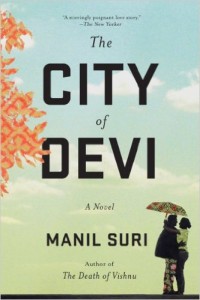 Looking for a Bollywoodesque post-apocalyptic novel set in India complete with Hindu gods and goddesses as well as superheroes (and if you’re not, why aren’t you?!)? Look no further. Just want a great, absorbing book with compelling characters and an unusual plot? This won’t disappoint. This volume, the third in Suri’s trilogy based on Hindu deities, manages to combine both absurdly, almost comically, exaggerated and deeply universal human elements. Told from the point of view of two very different but (as it turns out) related characters, this moving tale unfolds after havoc has been wrecked on the civilized world. A 9/11-like event has occurred on an international scale, creating worldwide instability. Unfettered capitalism, power grabs, religious-based and political-based terrorism, and the undoing of the technological infrastructure have combined to create a desperate situation in which two strangers, Sarita and Jaz, both set out to search for their missing loved one, becoming entangled along the way. Beyond its over-the-top backdrop and its frenetic pace, at its core this is a story of love, survival, and the universal need to create connections.
Looking for a Bollywoodesque post-apocalyptic novel set in India complete with Hindu gods and goddesses as well as superheroes (and if you’re not, why aren’t you?!)? Look no further. Just want a great, absorbing book with compelling characters and an unusual plot? This won’t disappoint. This volume, the third in Suri’s trilogy based on Hindu deities, manages to combine both absurdly, almost comically, exaggerated and deeply universal human elements. Told from the point of view of two very different but (as it turns out) related characters, this moving tale unfolds after havoc has been wrecked on the civilized world. A 9/11-like event has occurred on an international scale, creating worldwide instability. Unfettered capitalism, power grabs, religious-based and political-based terrorism, and the undoing of the technological infrastructure have combined to create a desperate situation in which two strangers, Sarita and Jaz, both set out to search for their missing loved one, becoming entangled along the way. Beyond its over-the-top backdrop and its frenetic pace, at its core this is a story of love, survival, and the universal need to create connections.






